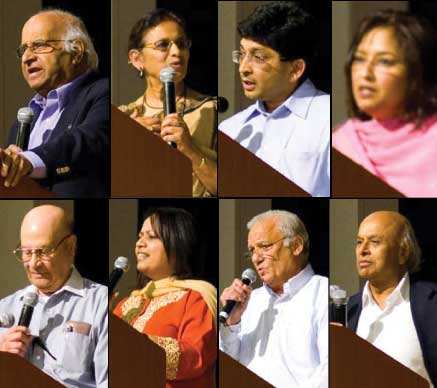Mir Anees and Chakbast Remembered in Milpitas
By A.H. Cemendtaur

Speakers pay tribute to Mir Anees and Chakbast at the Milpitas function in California
The San Francisco Bay Area is home to many ethnic groups, most comprising mainly of first generation immigrants. These immigrants may have left homes to escape injustice or to pursue better economic opportunities, but many among them are still tied to the culture they left behind.
For many immigrants from South Asia the Urdu language is part and parcel of the culture they miss. To cater to that nostalgia there are several prominent organizers of Urdu programs in the San Francisco Bay Area. Urdu teacher and a connoisseur of Urdu literature Hamida Banu Chopra is a big name among them. Hamida Banu regularly arranges programs where poetry of Urdu masters is read and the life-histories of the accomplished poets are recounted. In a recent program held at the Indian Community Center in Milpitas speakers celebrated the lives and works of Mir Babar Ali Anees and Pandit Brij Narain Chakbast by reading biographical accounts and selected poetry of the two poets.
Since Mir Anees was an established poet around the time of the 1857 uprising, many researches see Annes’s poetry as a form of lamentation of the tragic ending of that revolt. It is argued that in his mersiyas Anees is not just mourning the murder of Hussain Ibn e Ali, he is in fact grieving the mass killings of the local people by the British.
Pandit Brij Narain Chakbast was born eight years after the death of Mir Anees. It can be argued that Chakbast was so influenced by the literary environment of his city, Lucknow, that he wrote in the prevailing style — an example being Chakbasts’s poetic depiction of parts of Ramayan in the same manner the war of Karbala was covered by his colleagues.
The program on Anees and Chakbast started with Hamida Banu opening up the session. Jawed Umerani, a structural engineer by profession and an admirer of Urdu poetry at heart, read rubaiyat from Mir Anees’s poetry. Reading her paper on Mir Anees, Hamida Banu said Anees was in the fifth generation of a family of renowned poets. She informed the audience that Mir Babar Ali started writing poetry by the penname of “HazeeN” but changed his takhallus to Anees on the advice of Sheikh Nasikh. She quoted Maulana Abul Kalam Azad as claiming that Ghalib’s ghazals and Anees’s mersiyas were Urdu’s best gifts to the world literature.
Bay Area Urdu poetess Mehnaz Naqvi read selected couplets of Mir Anees. Haseeb Rizvi, hailing from Lucknow, described how he got his exposure to Anees and Chakbast in his younger years. He said he grew up in a neighborhood near Lucknow’s City Station, the next locality being the Kashmiri Mohalla where many prominent Kashmiri Pandit families, including Chakbast’s had lived. And a little farther up it was the neighborhood where Anees had lived, an area now appropriately named Koocha e Mir Anees.
Rizvi described his experience of listening to Mir Mohazzab, Mir Anees’s great grandson, reading Anees’s mersiya in Moharram. Rizvi spoke highly of Kashmiri Pandits -- Naseem, Brij Narain Chakbast, Bishan Narain Dar, and others -- and their contribution to Urdu. Rizvi spoke about other literary figures that had some relationship with Lucknow. He reminded the audience that Chakbast had attended Lucknow’s Jubilee College, the same college that Josh Malihabadi went to, and that Mir Taqi Mir was buried in the graveyard next to the college.
Local singer Sujata Roshan sang two ghazals of Chakbast. Mirza Ahmad Baig, one of the founding members of the now very popular Charminar Connection dot com, read a paper on Chakbast. He credited Chakbast with the introduction of political thought in modern Urdu poetry. Surender Chhibbar, originally from Delhi, read Chakbast’s ghazal.
The last speaker before the president’s concluding remarks was Hamida Banu who drew a comparison between the works of Anees and Chakbast. She said both poets wrote about universal values. As an example she described how Anees wrote about Ali Akbar seeking permission of his father Imam Hussein to go to fight in the war of Karbala, and Chakbast portrayed similar feelings of mother and son when Shri Ram is bidding farewell to his mother.
In his brief speech Dr. Wasim Siddiqui who presided over the program said that the mehfil on Anees and Chakbast was a testimony to the fact that Urdu was not only alive but was doing well in California. Photos courtesy of Lakhinder Walia
-------------------------------------------------------------------------------------

